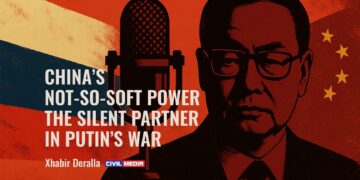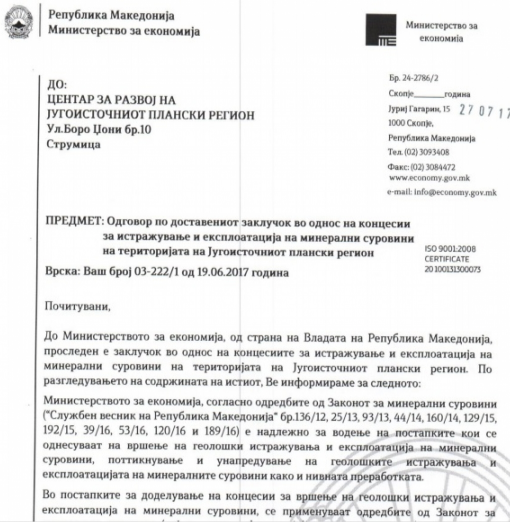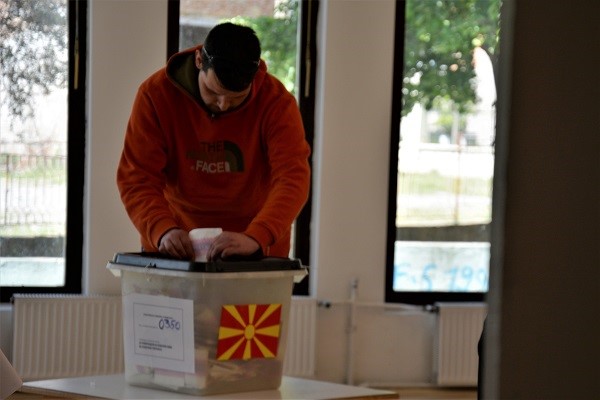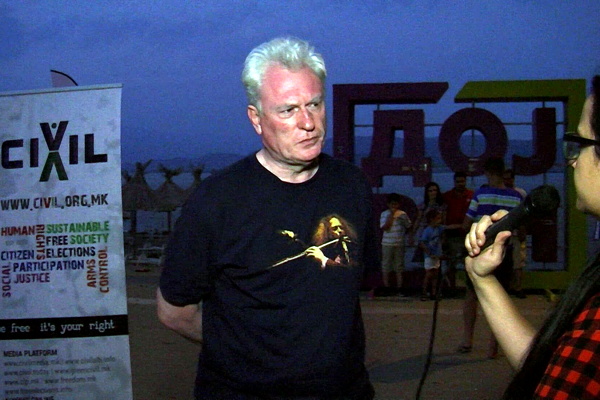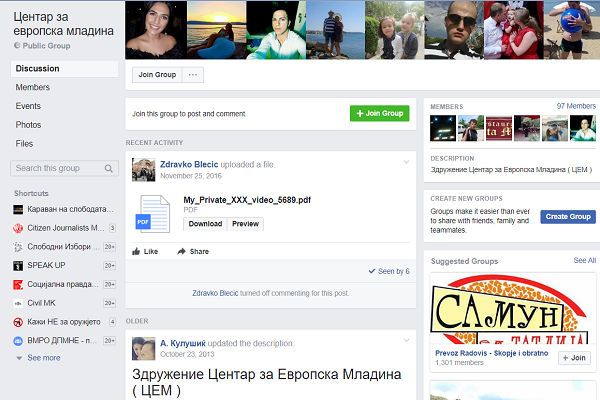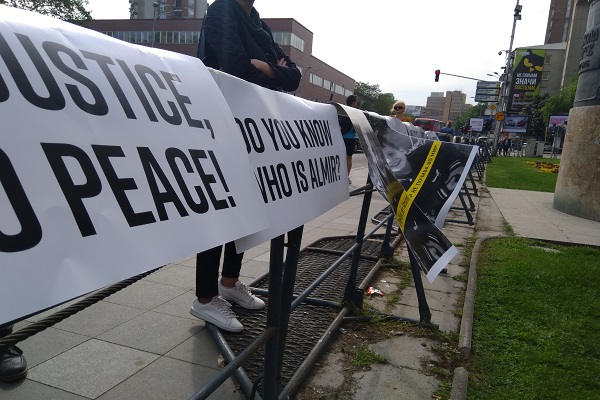By: Мaja Ivanovska
The latest decision of the Government for unilateral termination of the contract with the concessionaire of Kazandol, as well as the announcement for reexamining the contract with Euromax for the Ilovica mine, are a small but significant step forward in improving the situation with citizen participation in decision-making, primarily at the local level, but also at the national level.
The fight against the mines throughout the country, has proven to be a fight that is above all politics, while the organizing of local referendums, the ultimate outcome of which is non-binding in making the final decision, has proven to be a very strong argument and pressure on those who have the final word.
Referendums in Macedonia, until recently were a rare occurrence in this society, primarily because the citizen are used to representative democracy that is dominant both at the the local and national level, a situation that is a result of the view that the latter is more important than is direct democracy.
In this last year, after all the referendums were held, this image is slowly but surely starting to change in the direction which, above all, suits those who are most affected, the citizens of this country.
The “exclusive” right of the government to be privileged, untouchable and unpunishable, to make decisions solely out of personal interest, to seize and grasp all that is mutual, and even the basic human rights to air, water and free space, is no longer so available.
What happened to Macedonia in the previous year is actually an outcry of the distressed, deprived and underprivileged citizens who decided to put an end to the wrong decisions of the ones who they have chosen to represent them. Precisely this attitude of the ones who have the final word on the opening of the mines throughout the country, is the action that caused abrupt avalanche of protests, demands and referendums.
When it comes to the termination of the concession agreements, it is more than obvious that the new government is “looking for the hair in the egg”, which, in an attempt to meet its pre-election promises, is using all available means to stop the construction of the mines.
While for the Government concessionaire Sardic has not fulfilled the obligation under Article 13, paragraph 1 of the Concession agreement, that is, has not built a facility for exploitation of cathode copper within two years from the day the concession was granted, with a capacity to process at least 50 percent of the exploited mine, the investor, on the other hand, is categorical that not a single condition has been fulfilled for termination of the concession agreement for Kazandol.
We are yet to find out how much and whether this decision will cost us. The only thing that is certain is that the Kazandol mine will not continue to operate, while the fight for the other concessions will continue.
Warm – cold
Prior to the Government’s final decision on the termination of the agreement, there was a letter from the Minister of Economy, which most of the activists saw as a kind of pressure before one of the more significant referendums for the Kazandol mine was held, and that is the referendum in Valandovo. However, at the same time, this letter was also kind of testing the pulse of the citizens for possibly not terminating the agreement. The letter was sent to the Center for Development of the South-East Planning Region, namely, to the municipalities where referendums were held (Gevgelia, Bogdanci and Dojran), as well as to the Municipality of Valandovo, where a referendum was yet to be held on August 20, 2017.
The letter stated that the procedures for granting concessions for the opening of mines were lead according to the legal provisions, meaning that the opinion of all relevant institutions had been requested prior to the granting of the concessions, among which also from the municipalities on which territory the concessions are located. Positive opinions had been received from the municipalities for the granting of concessions for performing geological explorations and for exploration of the mineral resources.
“In the Law on Mineral Resources, and also in the Law on Concessions and Public-Private Partnership, there is no basis for a unilateral termination of the concession agreement by the grantor of the concession, that is the Government of RM, due to a realized referendum or a civic initiative, against the start of exploitation of already granted concessions for exploitation of mineral resources. In the direction of finally resolving this issue, the Government of RM as a grantor of concession, together with the Ministry of Economy in cooperation with all stakeholders, will first have to provide expert opinions and analyses, and then find a solution within the framework of the law”, was stated in the letter from Minister Bekteshi.
The Ministry of Economy made an analysis of the legal provisions that regulate this issue and henceforth emphasized that this is not an opinion of the Ministry.
“Having in consideration that according to the legal provisions, the Government of the Republic of Macedonia is the concession grantor, and the Ministry of Economy a body of the state administration responsible for performing the works in the field of mineral resources, the final reply and position in regards to this issue must come from the Government, a more precise solution will have to be found between the Government, the Ministry of Economy and the remaining stakeholders”, was said in the letter.
How did it all begin?
The government of VMRO-DPMNE granted unbelievably 375 concessions for exploitation of mineral ore to 43 domestic and foreign companies, of which about a dozen for exploitation of metallic mineral resources, which pose a great danger to the soil, plant life and to the environment. Following such a procedure of the previous government, the citizens, mainly from the south-east region of the country, decided to take matters into their own hands, to leave the obedience towards the parties and their leaders, and directly through referendums to enter the political scene, to publically express their views, determination and power.
A total of six referendums were held in the south-east region, of which three successful and three unsuccessful, due to insufficient citizen turnout.
The first referendum was held in Gevgelia on April 23, where the citizen turnout was 70%, of which 99% voted against the opening of the mines in their or their neighboring municipality. After that there was a referendum in Bogdanci on June 11, 2017, where 61% of the citizens with the right to vote voted, out of which 98% voted against. The third, and at the same time the last one in the series of successful referendums was the referendum in Dojran with a 51% turnout of the registered voters, of which 98% voted against the construction and opening of mines on the territory of the municipality and the neighboring municipalities. Unlike the previous two referendums, the pressures on the citizens in Dojran were more obvious, probably because of the determination of the citizens and civil society organizations to persevere in the intention.
The three referendums that followed in Bosilovo, Valandovo and Novo Selo were unsuccessful due to lack of citizen turnout.
Pressures and obstructions
CIVIL – Center for Freedom was the only organization accredited by the State Election Commission that was observing the referendums in the country, besides the observers – representatives of the referendum initiators.
During the entire monitoring of the preparation and realization of the referendums, CIVIL noted a larger number of pressures and obstructions on the ground. Starting from the obvious ones, such as the Mayor of Dojran, Borce Stamatov, not signing the decision of the Council for a referendum voting, and up to the findings on the pressures on citizens not to go to the referendum.
“The local referendums are exceptionally important for the democratic processes in a society. They directly affect the quality of the work of the institutions and testify about the participation of citizens in the decision-making processes. Obstructing such initiatives is unacceptable and anti-democratic. We completely support the initiatives for local referendums and demand from the institutions to meet their demands as soon as possible! We, as an organization that observes the electoral and political processes in the country, will remain on the ground and will monitor the situation”, stated then Xhabir Deralla from CIVIL.
Even though CIVIL registered minor irregularities, most being of technical nature at the referendums in Gevgelia and Bogdanci, the findings on the pressures and obstructions at the referendum in Dojran were announcing an ever fiercer battle of the government and the investors for the following referendums.
Jovan Dzalev, one of the initiators of the referendum in Dojran and part of the initiative “Save Dojran”, who unfortunately did not live to see the success of the citizens, spoke in front of the cameras of CIVIL Media about the course of the referendum in Dojran, about the uncertainty of the results until the very end, about the pressures that were carried out during the referendum day – in order not to achieve the necessary consensus, as well as about the upcoming referendum in Valandovo.
“The Referendum was really difficult. I would asses it as a referendum of political games! First of all, there was one political party that was applying maximum pressure on the citizens and did not give them an opportunity to decide for themselves on whether to go and vote or not. Huge pressure was carried out for there not to be a sufficient turnout and for the referendum to be declared unsuccessful. That is why the census was really slim”, stated Dzalev.
For the referendum in Valandovo that was yet to be held he stated “that will be the crescendo of everything!
Gevgelia was not that bad, Bogdanci – no, today we saw how it went in Dojran with pressures, but in Valandovo it will be horrible! That is why I think that the problem of the Kazandol mine and of the other mines should be raised to a little higher level. When I say higher, I mean the national level. To involve many environmental associations, NGOs, not only you as CIVIL who were present today, but many more, even the Helsinki Committee should be involved. I believe that then we will have no problem. Although I do expect that politics will do their work there too, and pressure will be exerted for there to be no census”, said Dzalev. And his predictions came true with the unsuccessful referendum in Valandovo.
Observers who do not know who they are observing for!?
Unlike the referendums in Gevgelia, Bogdnaci and Dojran, where CIVIL was the only non-governmental organization observing these processes, at the referendum in Bosilovo there was also the non-governmental organization Center for European Youth (CEY) from Radovis as an observer.
There is very little information in the public about this non-governmental organization. The organization has no website, and the last content on the Facebook group with the name of this organization is a video with the prefix xxx. After searching the Internet, the only information that can be found is that they are a member of the coalition “Go out to vote”, which observed the elections in 2014, and is led by the controversial organization Synergy from Stip.
Two observers of this organization were noticed in all the 19 polling stations in the Municipality of Bosilovo that were visited by CIVIL’s mobile monitoring teams.
“Look, 1.000 denars daily wage, why not?”, said one of the observers, but didn’t know what the organization that engaged him as an observer was working with.
At another polling station, when we asked two observers from which organization they were, they had to take their authorizations in order to read them to us. CIVIL Media contacted the President of the organization, Aleksandar Kulushic, who said that this was the first time for the organization to monitor an election process.
“The organization exists for 6-7 years, I have been the president for 6 years, and so far we have organized several humanitarian events around the Christmas holidays, for socially vulnerable families”, stated Kulushic for CIVIL Media. According to Kulushic, CEY had 40 observers on the ground.
The first step has been made, will there be new ones?
The closing of Kazandal is certainly a success, which primarily is due to the citizens, but we are yet to see whether it will be an isolated case or if the termination of agreements will continue. The revising of the legal aspects of the agreement for the concession of the Ilovica mine for now is only an announcement.
What is obvious is that even the organizations that actively participated in the recent struggle are actually surprised by their success, and the citizens even more. Finally, they have understood their role, as well the right to participate in decision-making at the local and national level. The Southeast has shown and proven that citizen activism is still alive!



